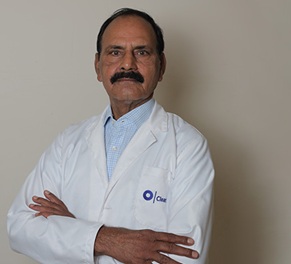Gastric Bypass Surgery - Procedure, Benefits, Side Effects
Dr. Aman Priya Khanna

Treatment Duration
2 Hours
------ To ------4 Hours
Treatment Cost
₹ 2,50,000
------ To ------₹ 4,50,000

According to a study by Madhur Verma et al., 2023, the prevalence of obesity was 44.0% in males and 41.16% in females. These rising numbers highlight the need for effective long-term weight loss solutions. Gastric bypass surgery is among the various bariatric procedures that have shown promising results in weight reduction.
The technique alters the digestive system to limit food intake and nutrient absorption. Want to know more? Continue reading to learn more about the gastric bypass surgery before and after results, benefits, risks, and recovery.
Procedure Name | Gastric Bypass Surgery |
Alternative Name | Roux-en-Y |
Conditions Treated | Obesity |
Benefits of the Procedure | Minimally invasive options, significant weight loss, improvement in comorbid conditions |
Treated By | General or bariatric surgeon |
You can check Gastric Bypass Surgery Cost here.
What is gastric bypass surgery?
Gastric bypass surgery is the most common bariatric procedure that helps in significant weight loss by altering the digestive system. It reduces the capacity of the stomach and rearranges the small intestine to limit food intake and nutrient absorption. This helps patients achieve and maintain a lower body weight.
It can be of two types:
Roux-en-Y Gastric Bypass (RYGB): The digestive tract is altered in two places. The upper portion of the stomach is attached to a part of the small intestine. Additionally, the top and bottom portions of the small intestine are connected together.
Mini Gastric Bypass Surgery: In this method, the digestive tract is modified in only one place (the tiny stomach pouch attached to the small intestine)
Conditions Treated With Gastric Bypass Surgery
Gastric bypass surgery makes long-term alterations to the metabolic system of an individual. This leads to the improvement of several obesity-related conditions. Some of the primary issues treated include:
Type 2 diabetes
Heart disease
Hyperlipidemia (high cholesterol)
Sleep apnoea (breathing repeatedly stops and starts during sleep)
Osteoarthritis
Expert Doctors (10)
NABH Accredited Hospitals (10)


Who needs gastric bypass surgery?
RYGB surgery is recommended for individuals who do not achieve sufficient weight loss through diet and exercise. The general criteria for those who may need this procedure are as follows:
Extreme obesity (body mass index of 40 or higher)
Obesity (BMI between 35 and 39.9) with comorbidities like type 2 diabetes, high blood pressure, or severe sleep apnoea
Willing to commit to a healthier lifestyle, including diet modifications and regular exercise
The Procedure of Gastric Bypass Surgery
Gastric bypass surgery can be performed using traditional open surgery or the laparoscopic technique. Today, about 90% of procedures are performed laparoscopically. The complete operation takes about two to four hours and includes the following steps:
Anaesthesia: Patients are given general anaesthesia to make them unconscious.
Incisions: In the laparoscopic technique, four to six small incisions are made in the belly. The surgeon inserts a laparoscope and surgical instruments through these cuts. For open surgery, a large vertical incision is made in the abdomen, from the chest to the belly button. The rest of the procedure is similar in both techniques.
Creating a Small Stomach Pouch: The surgeon uses staples to divide the patient’s stomach into a smaller upper pouch and a larger lower pouch. The upper part is made to hold about 28 grams of food, significantly less than the normal stomach.
Dividing the Small Intestine: It is divided into two segments. The lower portion is brought up and connected to the newly created small stomach pouch. As a result, food bypasses a part of the stomach and small intestine, and the body absorbs fewer calories.
Rerouting the Intestine: The top portion of the divided small intestine is connected to a further down part of the intestine, creating a “Y” shape.
Closing the Incisions: The incisions in the abdomen are closed with sutures or surgical staples.
Note: The selection of treatment approach is based on the patient’s condition and the doctor’s opinion.
Before and On the Day of Gastric Bypass Surgery
To ensure the success of gastric bypass surgery, patients must understand the preparatory steps required both before and on the day of the procedure. They must follow their surgeon’s instructions carefully.
Before Gastric Bypass Surgery
In the days leading up to gastric bypass surgery, patients will receive nutritional counselling and start a special guided protein diet to reduce their liver size and body fat. This diet is high in proteins and low in carbohydrates, fats, and sugars. Some other guidelines before the procedure are as follows:
Parameters | Prerequisites |
Pre-op Assessments |
|
Risk Evaluation |
|
Restrictions |
|
Anaesthesia Selection | General |
Fasting | 6-8 hours before surgery |
On the Day of Gastric Bypass Surgery
On the day of the surgery, patients should arrive at the hospital or surgical centre well-prepared. They can expect the following before the final procedure:
Parameters | Prerequisites |
Consent | Mandatory |
Surgical Preparation | Changing into a hospital gown |
Physical Evaluation | Vitals check-up (breathing, heart rate, temperature, etc.) |
IV Line | Yes, for fluids and medications |
Patient Positioning | Supine split leg |
After Gastric Bypass Surgery and Recovery
Patients experience quick weight loss within the first three to six months after the procedure, which results in body aches, dry skin, and hair loss. However, these problems resolve as the body adapts to weight loss. It is important to follow recovery guidelines to ensure successful healing.
In-Hospital Recovery
Patients are hospitalised for one to three days. During this stay, they are monitored for any complications of the procedure, such as bleeding.
After the procedure, individuals are moved to a recovery room. Anaesthesiologists check their vital signs, including heart rate and breathing.
Patients may receive medications to help control discomfort.
Once their condition stabilises, they are shifted to a general ward or private room.
Patients may have various tubes in place for urine collection and to drain excess fluid from the surgical site.
They are encouraged to walk a few steps to prevent blood clots.
At-home Recovery
For laparoscopic technique, gastric bypass surgery recovery time is about 2-4 weeks. However, for open surgery, people may need up to six weeks to resume their normal activities. During this period, patients can expect the following:
Keep the incisions clean and dry.
Take mineral and vitamin supplements to prevent nutritional deficiencies due to altered digestion and absorption.
Stay on a liquid or pureed diet for 2-3 weeks. After this period, they can add soft foods to their diet and then finally reintroduce solid foods.
Engage in light physical activity like walking.
Avoid heavy lifting and strenuous activities for 2-4 weeks after laparoscopic procedure and 6 weeks after open surgery.
Follow-Up Appointment
After gastric surgery, the first follow-up appointment is scheduled within one to two weeks. During this visit, patients can expect the following:
Removal of staples or stitches
Monitoring of surgical sites for signs of infection like redness or discharge
Blood tests to ensure the body is getting enough vitamins and minerals
Discussions with a dietician about nutritional adjustments
Benefits of Gastric Bypass Surgery
RYGB procedure has a high rate of long-term successful weight loss. It offers various benefits to individuals struggling with obesity and its associated health complications. The primary advantages of the surgery include:
Minimally Invasive Options: Gastric bypass surgery can often be performed laparoscopically. It is less invasive than traditional open surgery. This approach results in smaller incisions, less pain, and a quicker recovery time.
Significant Weight Loss: The procedure results in substantial weight loss within the first two years. Patients can expect to lose approximately 70% of their excess weight.
Treatment of Comorbid Conditions: The surgery improves or resolves various obesity-related diseases, including type 2 diabetes, hypertension, high cholesterol, and sleep apnea.
Risk and complication of Roux - en- gastric bypass
Like any major surgical procedure, gastric operation carries potential risks. These can range from minor to serious and should be carefully considered when deciding whether to proceed. Gastric bypass surgery side effects may include:
Infection
Significant bleeding
Blood clots
Reactions to anaesthesia
Breathing issues
Leaks in the gastrointestinal system
Patients may also experience some long-term complications after gastric bypass. These include:
Dumping syndrome (food moves too fast through the small intestine, causing symptoms like vomiting, nausea, diarrhoea, etc.)
Bowel obstruction
Gallstones
Hernias
Malnutrition
When to call a doctor?
Following stomach reduction surgery, patients must recognise which symptoms or changes in their health condition require immediate medical attention. The following are instances where contacting the healthcare team is recommended:
Signs of infection like warmth, swelling, redness, or bleeding around the incision
Fever above 100 F for more than 4 hours
Pain that does not get better with prescribed pain medication
Drainage from the incision that does not decrease in three days or becomes thick or yellow
Inability to eat or drink
Loose stools or diarrhoea
Vomiting after eating
Risks of Delaying Gastric Bypass Surgery
Delaying gastric bypass surgery can lead to several complications associated with the continued presence and progression of obesity. Here are some risks involved:
Worsening Health Conditions: Obesity-related diseases such as diabetes, hypertension, and sleep apnea may worsen over time without effective weight loss. This increases the risk of serious complications like heart disease or stroke.
Reduced Mobility: Increased body weight can exacerbate joint pain and mobility issues. It leads to a further decrease in physical activity and quality of life.
Psychological Impact: Continued struggles with obesity can also have negative effects on mental health, causing depression and anxiety.
Cost of Gastric Bypass Surgery
The expense of gastric bypass surgery can vary widely depending on several factors. Understanding these elements is vital for patients considering this procedure. Generally, the cost starts from ₹ 2,50,000 and reaches ₹ 4,50,000. The average price of the procedure is ₹ 3,20,000.
Procedure Name | Estimated Cost Range |
Gastric Bypass Surgery | ₹ 2,50,000 to ₹ 3,20,000 |
Note: The figures mentioned above are approximate. Individuals are advised to consult HexaHealth experts for up-to-date pricing information.
Factors that influence the cost of gastric bypass surgery in India include:
Surgeon’s Expertise: The medical expert’s experience can affect the cost. Highly qualified and well-known surgeons charge more for the services they provide.
Healthcare Facility: Private hospitals are costlier than public hospitals, but they often provide more personalised care and shorter wait times.
Geographic Location: Expenses can vary significantly based on the city where the surgery is performed. The procedure is expensive in urban centres and regions with a higher cost of living.
Pre and Post-Surgery Care: Preoperative evaluations, post-operative follow-ups, diet counselling, and other support services can add to the total cost.
Insurance: The extent of coverage provided can affect out-of-pocket expenses.
Takeaway
Gastric bypass surgery is an effective method for achieving significant weight loss. It also assists in the long-term management of diabetes, hypertension, and other metabolic disorders. This procedure, which alters the digestive tract, requires a commitment to a new lifestyle and diet to maintain the benefits.
At HexaHealth, we specialise in guiding patients through stomach reduction surgery, from initial consultation to post-operative care. Our experts ensure that you receive personalised support tailored to your specific health needs. We focus on improving both the safety and effectiveness of the procedure. Contact us TODAY!
Frequently Asked Questions (FAQ)
What is gastric bypass surgery?
Gastric bypass surgery is a weight-loss procedure that reduces the stomach size and reroutes the intestines. Limiting food intake and nutrient absorption significantly reduces body weight and improves related health conditions.
Is gastric bypass surgery the same as bariatric surgery?
Gastric bypass surgery is a type of bariatric surgery. The latter is a broader category that incorporates various procedures to help lose weight by making changes to the digestive system.
How is gastric bypass surgery performed?
Gastric surgery is performed under general anaesthesia. It involves two primary steps:
Creating a small stomach pouch using staples
Dividing the small intestine and rerouting the lower portion to this pouch
What are the benefits of gastric bypass surgery?
RYGB surgery offers various benefits to individuals suffering from severe obesity. These advantages include:
Significant weight loss
Improved management of diabetes, hypertension, and sleep apnoea
Reduced risk of heart disease
Increased mobility
What are the potential risks and complications of gastric bypass surgery?
Patients should discuss the gastric bypass surgery side effects with their doctor before the procedure. The potential risks may include:
Infection
Bleeding
Adverse reaction to anaesthesia
Blood clots
Difficulty breathing
How much weight can I expect to lose after gastric bypass surgery?
After gastric bypass surgery, patients can expect to lose around 70% of their excess body weight within 1-2 years. The amount can vary based on their pre-surgery weight, diet, and exercise post-surgery.
What dietary changes are required after gastric bypass surgery?
Dietary changes after gastric bypass surgery involve progressing through several stages, from liquids to solid foods. It focuses on the following:
High-protein, lean foods
Low in fats and sugar
Limited caffeine, as it causes dehydration
Taking recommended nutritional supplements to prevent deficiencies
How long does it take to recover from gastric bypass surgery?
Gastric bypass surgery recovery time typically involves a hospital stay of 1-3 days. After the laparoscopic procedure, most people return to normal activities within 2 to 4 weeks. However, recovery from open surgery may take up to six weeks.
What follow-up care is needed after gastric bypass surgery?
Gastric bypass surgery before and after requires adherence to dietary guidelines and regular exercise to maintain health. Follow-up care after the procedure includes the following:
Regular visits to monitor weight loss and nutrition
Routine lab tests to check for deficiencies
Dietary counselling
Support for lifestyle changes to ensure long-term success
Are there any long-term effects after gastric bypass surgery?
Yes, the RYGB procedure can cause certain long-term effects or complications after the procedure. These may include the following:
Bowel obstruction
Dumping syndrome
Hernia
Gallstones
Malnutrition
How is gastric bypass surgery different from sleeve gastrectomy?
Roux-en-Y gastric bypass is a two-step procedure that reduces the stomach size and reroutes the small intestine. On the other hand, sleeve gastrectomy only involves removing a part of the stomach to reduce its size.
Is bariatric surgery safe?
Bariatric surgery is considered safe and effective for significant and sustained weight loss when performed by an experienced surgical team. However, it carries surgical risks like bleeding and infection and requires long-term lifestyle adjustments.
Can I live a normal life after gastric bypass surgery?
Yes, most people can live normal lives after stomach reduction surgery with improved health and mobility. Adherence to dietary and lifestyle changes is important for maintaining weight loss.
More Treatment options
References
All the articles on HexaHealth are supported by verified medically-recognized sources such as; peer-reviewed academic research papers, research institutions, and medical journals. Our medical reviewers also check references of the articles to prioritize accuracy and relevance. Refer to our detailed editorial policy for more information.
- Verma M, Esht V, Alshehri MM, Aljahni M, Chauhan K, Morsy WE, et al. Factors Contributing to the Change in Overweight/Obesity Prevalence Among Indian Adults: A multivariate decomposition analysis of data from the National Family Health Surveys. Advances in Therapy [Internet]. 2023 Dec 1;40(12):5222–

- UCLA Health. Gastric Bypass Surgery - Bariatric Surgery | UCLA Health [Internet]. www.uclahealth.org.

- Gastric Bypass (Roux-en-Y) Surgery: Requirements & Recovery [Internet]. Cleveland Clinic. 2022.

- Mayo Clinic. Gastric bypass (Roux-en-Y) - Mayo Clinic [Internet]. Mayoclinic.org. 2017.

- Gastric bypass surgery: MedlinePlus Medical Encyclopedia [Internet]. medlineplus.gov. 2022.

- Roux-en-Y Gastric Bypass Weight-Loss Surgery [Internet]. www.hopkinsmedicine.org.

- Mitchell BG, Gupta N. Roux-en-Y Gastric Bypass [Internet]. PubMed. Treasure Island (FL): StatPearls Publishing; 2021.

- Gastric bypass surgery - discharge : MedlinePlus Medical Encyclopedia [Internet]. medlineplus.gov.

- Australia H. Gastric bypass surgery [Internet]. www.healthdirect.gov.au. 2020.

- Mayo Clinic. Obesity [Internet]. Mayo Clinic. Mayo Clinic; 2023.

- Mayo Clinic Staff. A guide to eating after gastric bypass surgery [Internet]. Mayo Clinic. 2018.

Last Updated on: 4 May 2024
Reviewer

Dr. Aman Priya Khanna
MBBS, DNB General Surgery, Fellowship in Minimal Access Surgery, FIAGES
14 Years Experience
Dr Aman Priya Khanna is a well-known General Surgeon, Proctologist and Bariatric Surgeon currently associated with HealthFort Clinic, Health First Multispecialty Clinic in Delhi. He has 14 years of experience in General Surgery, Proctolo...View More
Author

She has extensive experience in content and regulatory writing with reputed organisations like Sun Pharmaceuticals and Innodata. Skilled in SEO and passionate about creating informative and engaging medical conten...View More
Gastric Bypass Surgery Cost in Top Cities
Latest Health Articles
































